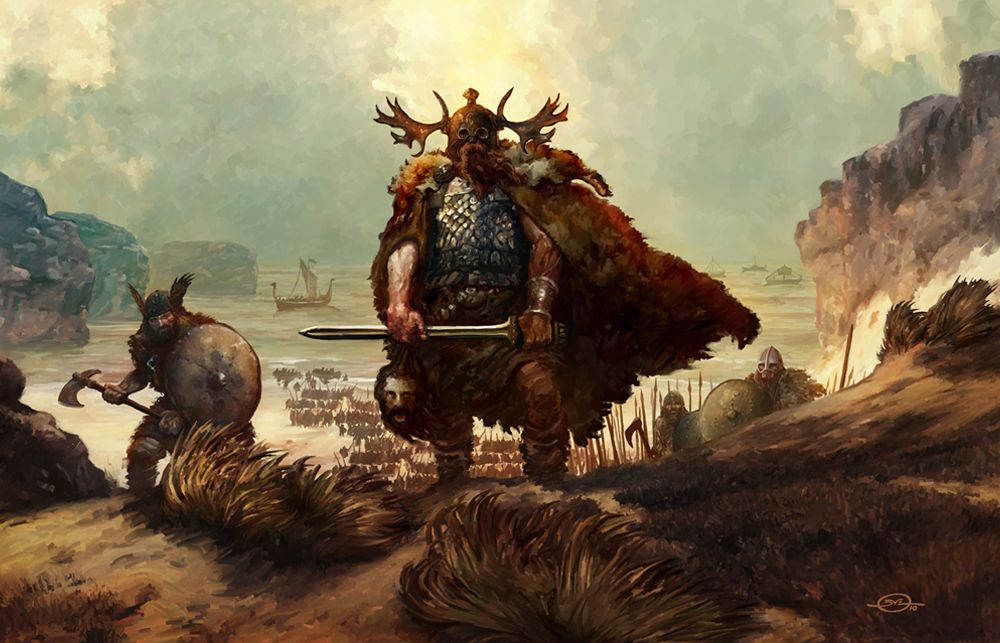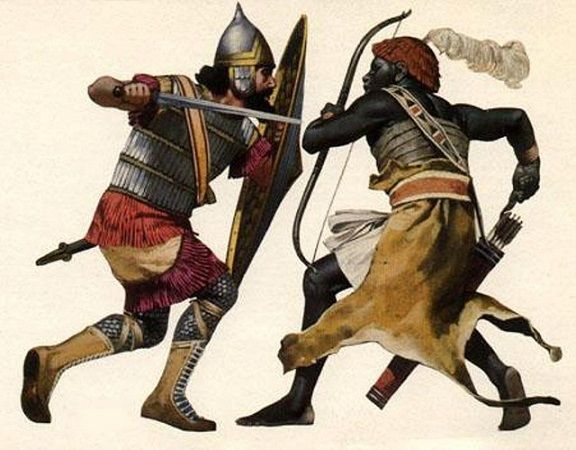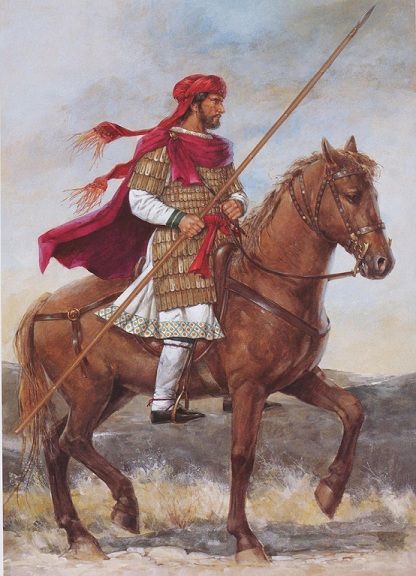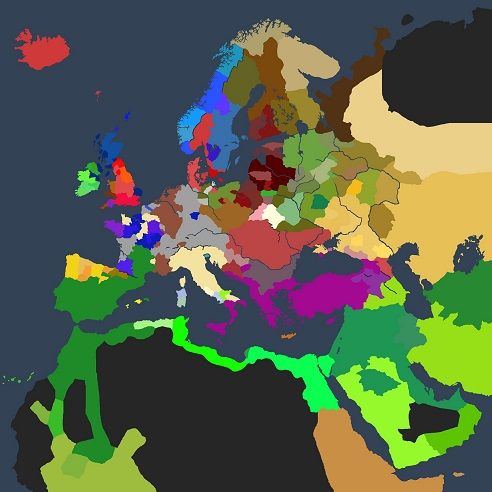Through the Viking Age Norsemen terrorized Europe and the Mediterranean perpetrating destruction against the civilized world on a scale unseen since the barbarian invasions of the Roman Empire centuries before. Worse still than the threat of raiding and pillage was that of invasion - during this period Russia, the British Isles, and most significantly, Egypt were to face the horrors of full blown Norse invasion. This is the story of the latter of those invasions and the consequences that followed, the Tales of the Egypto-Norse.

The Serpents of the Nile - The Tales of the Egypto-Norse
- Thread starter Tommy4ever
- Start date
-
We have updated our Community Code of Conduct. Please read through the new rules for the forum that are an integral part of Paradox Interactive’s User Agreement.
You are using an out of date browser. It may not display this or other websites correctly.
You should upgrade or use an alternative browser.
You should upgrade or use an alternative browser.
Starting another AAR  , as you could probably guess from the title in this AAR I will be playing the Old Gods DLC. I started out as Bjorn the Ironside and moved to invade Egypt. I subsequently give up my lands in Scandinavia to migrate entirely to Egypt, playing as a Norse realm based on the Nile. Something a bit different from the usual root taken in a Viking game
, as you could probably guess from the title in this AAR I will be playing the Old Gods DLC. I started out as Bjorn the Ironside and moved to invade Egypt. I subsequently give up my lands in Scandinavia to migrate entirely to Egypt, playing as a Norse realm based on the Nile. Something a bit different from the usual root taken in a Viking game  . Hopefully its a fun ride for us all.
. Hopefully its a fun ride for us all.
Starting another AAR, as you could probably guess from the title in this AAR I will be playing the Old Gods DLC. I started out as Bjorn the Ironside and moved to invade Egypt. I subsequently give up my lands in Scandinavia to migrate entirely to Egypt, playing as a Norse realm based on the Nile. Something a bit different from the usual root taken in a Viking game
. Hopefully its a fun ride for us all.
Lets just hope you don't get wiped out by the stronk Abbasids. Quite a unique start, I must say.
Björn, Ironside, Ragnarrsson af Munsö
Lived: (est.) 821-889
Petty King of Svipjod: 860-872
High King of Svipjod: 872-880
King of Egypt: 880-889
Head of House af Munsö: 860-889

Lived: (est.) 821-889
Petty King of Svipjod: 860-872
High King of Svipjod: 872-880
King of Egypt: 880-889
Head of House af Munsö: 860-889

By far the most successful of the ‘sons’ of legendary King Ragnar Lobrok, and indeed of any of the great warlords of the Viking Age, Björn Ironside is remembered as both a magnificent leader of men and the most tyrannical conquerors of the most barbarous of ages. Whilst his earlier life remains shrouded in the legends of proto-historical Sweden in his later life the scale of his actions began to attract the attention of writers from the Eastern Mediterranean and Catholic West alike. What is clear is that by the time he made the transition towards being a historical figure in the 870s and 880s he already dominated Sweden – making him the most powerful of the Norse lords in Scandinavia.
Whilst the Great Heathen Army set off to avenge Ragnar Lobrok in England, Björn resisted the temptation to join with his brothers in war against the petty kinglets of the British Isles and instead went on the warpath closer to home – subjugating most of the lesser chieftains of Southern Sweden during the last years of the 860s.
It would not be until after his wars in Sweden had been concluded that Björn would transform himself into both an eternal legend in his homeland and a historical figure abroad. This links between the Swedes and the Rus, and indeed between the Ironside and the Rus King Rurik, were strong and information had spread of the great riches of Byzantium and a route to reach it (through the great rivers of Eastern Europe). The Rus had raided Constantinople as early as 860, and Björn appeared eager to follow in the footsteps of his cousins to the East.
Setting off from Sweden in 870 Björn travelled through the Great Rivers of the East, emerging from the Dnieper into the Black Sea. After several months raiding the scarcely protected Byzantine towns of the region the Ironside struck at Constantinople – raiding the environs of the city before being forced to withdraw following the arrival of an Imperial Army. However the Byzantines were not able to prevent Björn’s raiders from escaping their clutches in Thrace and sailing through the Marmara to the Aegean and Mediterranean. From there Björn terrorised the Eastern Mediterranean world for two years – Smyrna, Thessalonica, Athens, Antioch, Acre, Alexandria, Damietta – just a few of the cities that faced the terror of the Swedish Vikings as the ravaged the most civilised area of the known world. But the greatest triumph and atrocity of the ‘Great Raid’ came at its very climax as the Norsemen sacked, looted and all but burnt to the ground the prosperous city of Venice. The Republic would not recover for almost a century whilst Björn’s name became infamous across Europe and the Near East.
Upon his return to Scandinavia Björn’s star had risen immeasurably high. Not only was he now the richest of all the Norsemen, his brothers had also failed in their efforts to conquer England – the Great Heathen Army being destroyed by a coalition of Northumbrians and Mercians – leaving him with unmatched prestige. With this in mind he proclaimed himself the High King of Sweden (or Svipjod), this title would remain the most prestigious amongst the Norse of Northern Europe through to the end of the Viking Age.
The great warrior was far from done. As the victories in the South were celebrated in a great blot (a festival involving human sacrifice) Björn Ironside was already planning a second, far larger expedition – this time with the goals beyond simple plunder. As the chieftains of the North wilfully swore allegiance to Björn the High King began to assemble a new army. During the Great Raid the Vikings had found that, in contrast to the Byzantine Empire, the Muslim powers of the Near East – the Abbassids in the Levant and Mesopotamia and the Tulunids of Egypt – were weak and divided, and incredibly wealthy. This view was reinforced by the diplomacy of the Byzantines. The Byzantines had a long history of taming violent barbarians through diplomatic means and their treatment of the Norsemen was no different. As the Muslims turned aghast at the barbarism and paganism of the Vikings the Byzantines opened up diplomatic channels with the Swedes, their aim was to redirect the energies of the Norsemen away from the Byzantine Empire and towards its enemies in the Muslim world. Tales of the weakness of the Muslims and their great wealth, information that corresponded with the Norsemen’s experiences during the Great Raid, helped convince Björn that the Islamic world was there for the taking and he had his eyes on its greatest prize –Egypt.
Björn Ironside’s great host took around two years to assemble, attracting thousands from across Scandinavia – including legendary warriors like Kolbjörn af Kalmarhus (who would later lead a large section of the army in Egypt). The great barbarian army finally set off as soon as the snow melted in the Spring of 875. 18,000 men – 4,000 of which were Slavic mercenaries recruited through the Ironside’s connections in Holmgard – the rest Norsemen from across Scandinavia, accompanied by the largest fleet that had ever been assembled by a Viking leader.
Arriving in July 875 Björn and his host descended upon Northern Egypt like a plague, sacking Alexandria in August and one by one seizing the cities of the Delta. The Norse had arrived in Egypt, few would ever return to the North, not least amongst them the High King himself.
In the year before the arrival of the Norsemen the Tulunid Sultanate of Egypt had been hit by a Civil War, leaving disunity amongst the Egyptians, but more importantly it had sapped the country’s much needed military manpower. This in large part explains the failure of the Tulunids to muster enough men to drive out the invaders. At the Battle of Abu Rowash (just to the West of the capital, Fustat) the Arabs had just 8,500 men – their army being dwarfed by the Norse who also benefited from a far higher quality of soldier. The Arabs were smashed, by the end of 875 Tulunid authority along the Nile had collapsed.
From 876 the Tulunids could do little but send small raiding parties from their base in Cyrenaica to harass Björn’s armies and support what resistance the local population and lords could manage. Needless to say the Northmen went from triumph to triumph. The gruesome savagery of the Viking conquest of Egypt was much talked about by Christian and Muslim writers of the time alike. Along almost certainly gross exaggerations were common it seems likely that the population of Egypt fell by around 10-30% from 875 to 900 through a mixture of warfare, famine (caused in large part by the destruction of the agricultural infrastructure during the invasion) and emigration. Indeed, Björn’s conquest was perhaps the greatest human tragedy ever to have been suffered by Egypt – a country no stranger to the concept.
At the time the Norse also benefited from an extremely favourable geopolitical situation with the Sunni Abbasid Caliphate (that surely would have sent assistance otherwise) being embroiled in decades of instability, the Byzantine Empire having little interest in sending assistance to the Muslims in Egypt, and still believing the Norse could be controlled and the Tunis based Aghalabid Sultanate lacking the resources to embark on an adventure in Egypt. In essence Egypt had been abandoned to Björn.
As the dust settled on the invasion in 878 Björn set out to divide up the new realm amongst his army. Alexandria and Fustat – the country’s two wealthiest cities – were placed under his personal control whilst at Aswan a new capital was built, far from the corruption and softer living to be found in the Arab and Roman palaces of the former two cities. Elsewhere the great Kolbjörn Kalmarhus was granted the Sinai, the King’s only son was granted the rich Delta whilst the rest of the country was split amongst the minor nobility of the army.
As the ageing Björn Ironside settled down to rule his new realm from Aswan – proclaiming himself King of Egypt and relinquishing his Swedish throne in 880 – the Egypto-Norse population as a whole remained as militant and aggressive as ever. Egypt now became a base for raiding across the Mediterranean world – Pisa and Genoa were sacked in 879 by Björn’s son and heir Eirikr – whilst the Byzantines began to pay a small tribute to Aswan to spare themselves from Viking raids. At the same time those amongst the Norse nobility who had failed to gain sufficient lands in 878 moved out to expand Egypt aggressively Southward and Westward, Eirikr was again at the forefront, capturing Tobruk in 886.
Although to his followers and enemies alike he had seamed barely human, Björn Ironside’s mortality finally caught up with him as he passed away peacefully at his capital of Aswan in 889. Thus ended the life of the greatest of all the Vikings.
- 1
Well, this is unique. I hope the Vikings brought their summer clothes. I wonder if they would have held the pyramids and other Egyptian monuments in awe, or if they would have shrugged and gone about looting and destroying?
This is awesome! I cant wait to see how your Egypto-Norse develop. Also, if i may ask two questions, who did you give the kingdom of Sweden to, and did you plan to conquer Egypt, or
just saw that they were in political disunity and went for it? I will follow, and may Odin and Osiris guide you (I know the ancient Egyptian religion is extinct at the point of time in your game, I'm sure those old gods would look favorably on polytheists ruling Egypt, and not followers of some one true god)
just saw that they were in political disunity and went for it? I will follow, and may Odin and Osiris guide you (I know the ancient Egyptian religion is extinct at the point of time in your game, I'm sure those old gods would look favorably on polytheists ruling Egypt, and not followers of some one true god)
Haha, I love the idea! Some reformed Norse actually invaded the kingdom of Jerusalem in my mega-campaign, and I was thinking about how much fun a game like that would be.
A very successful first ruler. Show the decadent Muslims how a true holy warrior fights!
Lets just hope you don't get wiped out by the stronk Abbasids. Quite a unique start, I must say.
I got very lucky that Norse Egypt was sheltered whilst still young from the Abbassids, they really could have crushed me if they had been united.
Well, this is unique. I hope the Vikings brought their summer clothes. I wonder if they would have held the pyramids and other Egyptian monuments in awe, or if they would have shrugged and gone about looting and destroying?
I think I should address how the Norse feel about the incredible relics of ancient Egypt in the next update, so I'll be thinking on this one - definitely an interesting point. I'd imagine they would have at first been in awe before continuing with the looting and pillaging to start with, but perhaps living in Egypt over a longer period of time they will be more effected.
This is awesome! I cant wait to see how your Egypto-Norse develop. Also, if i may ask two questions, who did you give the kingdom of Sweden to, and did you plan to conquer Egypt, or
just saw that they were in political disunity and went for it? I will follow, and may Odin and Osiris guide you (I know the ancient Egyptian religion is extinct at the point of time in your game, I'm sure those old gods would look favorably on polytheists ruling Egypt, and not followers of some one true god)
I gave the Kingdom of Sweden to the ruler whom I had the highest relations with at the time (the House of Auster, IIRC they ruled Aland at the time). As I couldn't decide any fairer way to give it away.
I planned invading 'somewhere' - preferably in the Med, but didn't decide exactly where until the opportunity arose in Egypt.
Haha, I love the idea! Some reformed Norse actually invaded the kingdom of Jerusalem in my mega-campaign, and I was thinking about how much fun a game like that would be.
I've only recently got the Old Gods expansion myself so don't have much experience - but its definately different to the usual root of raiding the North Sea and conquering Britain.
A very successful first ruler. Show the decadent Muslims how a true holy warrior fights!
Indeed!
I'd also like to mention that the next few updates will be including some hand drawn images made by my new collaborator
This is awesome. I'm wondering if you plan to stay Norse all the way, or convert at some point? Any would be extremely interesting IMO. 
Ooh, hand drawn? This'll improve the AAR even more!
I do hope you stay Norse through it all. Build up a powerbase in Egypt until you can finally reclaim the holy sites, and once you're named Fylkir, reclaim your ancestral lands in Sweden if they are not ruled by the Austers.
I do hope you stay Norse through it all. Build up a powerbase in Egypt until you can finally reclaim the holy sites, and once you're named Fylkir, reclaim your ancestral lands in Sweden if they are not ruled by the Austers.
I think you should do a mega campaign because you're idea of vikings in egypt is great ! I actually once saw in my game vikings who formed a mauretanian kingdom which I thought was funny 
I like the idea of this. I hope the Caliph doesn't come knocking and end this early or force you to relocate and have a redundant name to the AAR.
Eirikr I, the Wise, Björnsson af Munsö
Lived: 840-898
King of Egypt: 889-898
Head of House af Munsö: 889-898
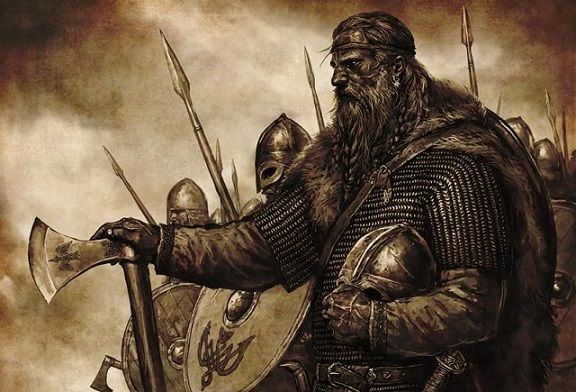
Lived: 840-898
King of Egypt: 889-898
Head of House af Munsö: 889-898

By the time he succeeded his father in 889 Eirikr was already amongst the oldest warlords in Egypt. Having spent a lifetime fighting in his father’s wars and then after the conquest of Egypt setting out on raids and conquests of his own Eirikr was a seasoned fighter. Like so many of the early Norse settlers in Egypt he was always uncomfortable with the settled life and disdained the local inhabitants, preferring to remain on the move and at war. It is therefore perhaps unsurprising that Egypt was not at peace for a single entire year through Eirikr’s brief rule.
The impact that Egypt had on the Norse incomers’ worldview was quite tremendous. Not only were the cities larger and the country far more advanced than anything they had previously come into contact more prolonged than raiding with – Egypt’s ancient civilisation had left behind monuments that the Vikings could barely comprehend – leaving them stunned and in awe. Whilst most of the first generation of settlers would reject Egyptian civilisation, seeing their ancient nation as more opportunity for plunder, a small but growing section of the Norse would become Egyptophiles – those who saw Egyptian civilisation as superior to their own and wished to form a more integrated intercourse between their own ways and those of the Egyptians.
Hoping to take advantage of any instability caused by the death of King Björn, just one month after Eirikr’s ascension the Solomonid Kingdom of Abyssinia invaded Egypt. Having revived the ailing Axumite kingdom and uniting the old Empire the Solomonids had begun to look Northwards. Their expansion into Nubia came to an end as their border reached those of Norse Egypt. However, the Abyssinians were confident that the Vikings could be defeated. Invading Norse Nubia the Abyssinians hoped to encourage a Coptic rebellion in Egypt itself by appealing to the Pope of Alexandria – allied with their co-religionist fifth column the Abyssinians believed destroy the Egypto-Norse Kingdom and bring the riches of Egypt under their power.
The Abyssinians were to be frustrated in their attempts at subversion as Eirikr sought an agreement with the Coptic Pope of Alexandria. The Pope had been forced to flee Alexandria following the Norse invasion – relocating to Fustat, where the destruction had been less severe. Eirikr made an agreement with the Pope in return for promises of loyalty of both himself and the Christian population of Egypt, he would be allowed to return to Alexandria and a limited sort of religious freedom was granted to the Christians of Egypt – their Churches were to be protected by the laws of the Kingdom and their worship permitted. This friendlier relationship with the Coptic Church (at least compared to the all-out hostility that had preceded it and remained the state of affairs with the Muslims) perhaps explains why the Egyptophile faction within the Kingdom became ever more associated with Christianity and the native Coptic Church, whilst Islam became associated with support for the Arabs – especially the Abbassid Caliphate which wielded significant influence over a large part of the Egyptian population and even some Norsemen, and the Norse faith with the traditional Viking warrior elite.
Meanwhile, despite early successes in Nubia the Abyssinians were decisively beaten just outside Aswan. Whilst the war continued until 891 the Abyssinian dream of uniting the entire Nile Valley under their own Christian rule was over.
With the threat from the South defeated Egypt looked once more to expand. With raiding, primarily in Italy and North Africa, resuming Eirikr launched an invasion of Cyrenaica – an invasion that soon escalated out of control as the war in Cyrenaica expanded far beyond the initial limited aims. With the resistance of the local Sheiks in Cyrenaica dying down rebellion broke out in Egypt as several Norse lords, angered by the power of the royal house – which controlled virtually all of the rich land along the Nile, leaving other houses with only marginal scraps, and its attempts to curtail their independent action (Eirikir had tried to limit the absolute autonomy of his vassals), looked to overthrow their King. The rebellion was short lived, withdrawing from Cyrenaica to deal with the threat at home Eirikr had defeated the rebels near Alexandria before negotiating a quick truce (helped on by the timely and suspicious death of one of the rebellions leading participants). However, in the West the Aghalabid Sultan had perceived the rebellion in Egypt as the time to strike, hoping to roll back the Viking realm and seize Egypt for himself. However, he too faced defeat as Eirikr won victory at Tobruk before pursing the invaders into Cyrenaica where they were destroyed – the Aghalabids making peace shortly thereafter. With these more serious threats dealt with Eirikr proceeded with the subjugation of Cyrenaica – annexing the entire region with the exception of the city of Benghazi in early 894.
Leaving his realm well over a year to recuperate, Eirikr went to war once more in 895 as he launched an invasion of Abyssinia. With the Abyssinian border still within striking distance of Egypt’s capital at Aswan, Eirikr wished to expand his Nubian buffer zone between Egypt and the Christian Kingdom to the South. The Viking army marched right into the heart of Abyssinia – looting the country’s capital and its heartlands in the Ethiopian Highlands before the King agreed to a peace treaty – ceding a large portion of Nubia to Egypt.
Egypt had now emerged as major player in the Eastern Mediterranean, capable of going toe to toe, and defeating regional powers like the Aghalabids and Abyssinians – and forcing both the Abbassids and Byzantines to accept their existence, the Abbassids having joined the Byzantines in opening up diplomatic relations during Eirikr’s rule. Yet as the Egypto-Norse Kingdom began to appear to be a more permanent feature, its energetic Viking nature appeared to be threatened by a drift towards becoming a sedentary Empire.
Having been severely injured in Abyssinia towards the end of the war, the old King’s health rapidly worsened, as he died the following year. His successor, Hakon, the Cruel, would return to the Viking nature upon which the Kingdom had been built – bringing the fury of the Old Gods down upon his enemies.
Last edited:
Such a great response in the comments!  Hope this keeps up.
Hope this keeps up.
I think the religious future of the Kingdom is amongst the most interesting aspects of its future at this point. Sunni Islam, the Norse faith, Catholic, Orthodox or Miaphysite Christianity all offer interesting futures. What will I go for? You'll have to keep reading to find out .
.
Hope you like the drawing, I'm sure if it gets a positive response I can convince my collaborator to make more.
If I manage to keep playing this all the way to the end I may well convert to EUIV if the converter is good and its still and interesting situation. I think Viking Mauretania makes a bit more sense than Egypt - afterall the Vikings raided that region very heavily. But Viking Egypt is way cooler .
.
Thanks!
Hope you enjoy the story.
I see you are named after our great founder, we have not had to face the Caliph yet. But this situation can surely not continue indefinitely.
This is awesome. I'm wondering if you plan to stay Norse all the way, or convert at some point? Any would be extremely interesting IMO.
I think the religious future of the Kingdom is amongst the most interesting aspects of its future at this point. Sunni Islam, the Norse faith, Catholic, Orthodox or Miaphysite Christianity all offer interesting futures. What will I go for? You'll have to keep reading to find out
Ooh, hand drawn? This'll improve the AAR even more!
I do hope you stay Norse through it all. Build up a powerbase in Egypt until you can finally reclaim the holy sites, and once you're named Fylkir, reclaim your ancestral lands in Sweden if they are not ruled by the Austers.
Hope you like the drawing, I'm sure if it gets a positive response I can convince my collaborator to make more.
I think you should do a mega campaign because you're idea of vikings in egypt is great ! I actually once saw in my game vikings who formed a mauretanian kingdom which I thought was funny
If I manage to keep playing this all the way to the end I may well convert to EUIV if the converter is good and its still and interesting situation. I think Viking Mauretania makes a bit more sense than Egypt - afterall the Vikings raided that region very heavily. But Viking Egypt is way cooler
Loving both the concept and the writing style. Can't wait to hear more of this!
Thanks!
Very interesting idea, I'll be following this!
Hope you enjoy the story.
I like the idea of this. I hope the Caliph doesn't come knocking and end this early or force you to relocate and have a redundant name to the AAR.
I see you are named after our great founder, we have not had to face the Caliph yet. But this situation can surely not continue indefinitely.
This AAR has a production budget over 9000! O:
Looking good, man. Can we have more?
Looking good, man. Can we have more?
Great chapter. However… not sure bringing the furry of the Old Gods is the right term. Unless they're throwing wolves or something.







